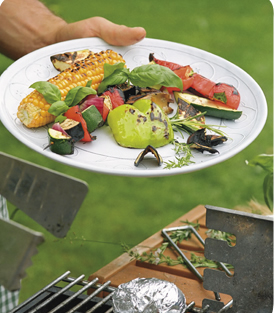Taming the Flame
Enjoy summer grilling with an ounce of prevention
Written by: Nancy Burke, R.D., Danielle Karsies, M.S., R.D., and Melissa Shannon-Hagen, R.D., CSO, U-M Rogel Cancer Center Symptom Management and Supportive Care Program

We know eating healthy is important in fighting cancer. So how can you enjoy that summer cookout with friends and families without tossing healthy eating aside? Here are some tips on how to grill safe.
Each year, University of Michigan Rogel Cancer Center dietitians field questions from patients about whether it's safe to grill, given the evidence that grilled meats may contain cancer-causing agents. Guidelines from the American Institute for Cancer Research (AICR) suggest that the type of food you grill may be more important than how you prepare it.
Hot dogs and hamburgers -- the all-American summer standards -- may be among the worst offenders in causing colorectal cancer. Research shows a convincing link between diets high in processed meat and red meat -- which includes beef, pork and lamb. Every 3.5 ounces of processed meat -- about two hot dogs – increases the risk for colorectal cancer by 42%.
Given the data, we recommend that patients follow AICR guidelines:
- Limit the amount of red meat you eat. Think of it as an occasional indulgence.
- Make processed meats including hot dogs a treat for a special occasion – like an annual outing at the ballpark.
And continue to use caution when grilling. All animal meats produce cancer-causing chemicals when they are seared at high temperatures -- whether on a grill or on a conventional stove. It’s still unclear whether eating these chemicals will increase your cancer risk. But while researchers continue to learn more about whether there’s a link between grilling and cancer, you can protect yourself and still enjoy a backyard barbecue. Read on to learn strategies to limit your exposure.
GRILLING TIPS
You know the blackened bits that cling to the meat? The stuff cooks love for its flavor? Well, unfortunately, that's the stuff that contains all the toxins that may increase your cancer risk. Try not to eat it and consider these tips for limiting your exposure:
![]() Chicken out. The most important thing you can do -- whether you're grilling or not -- is limit red meats and processed meats that contain nitrates. Choose chicken or fish instead.
Chicken out. The most important thing you can do -- whether you're grilling or not -- is limit red meats and processed meats that contain nitrates. Choose chicken or fish instead.
![]() Marinate your meat. Research has shown that a marinade can reduce the formation of carcinogens by more than 90%.
Marinate your meat. Research has shown that a marinade can reduce the formation of carcinogens by more than 90%.
![]() Experiment with vegetables and fruits. Cancer-causing chemicals only arise from grilling animal tissue. Blackened bits on fruits and vegetables are harmless.
Experiment with vegetables and fruits. Cancer-causing chemicals only arise from grilling animal tissue. Blackened bits on fruits and vegetables are harmless.
![]() Scale back meat portions. Consider kabobs. It's a great way to add fruits and vegetables while cutting back on meat.
Scale back meat portions. Consider kabobs. It's a great way to add fruits and vegetables while cutting back on meat.
![]() Limit flare-ups that char food by selecting leaner meats or grilling on aluminum foil. If you use foil, punch small holes to allow the fat to drain.
Limit flare-ups that char food by selecting leaner meats or grilling on aluminum foil. If you use foil, punch small holes to allow the fat to drain.
![]() Flip meat frequently to prevent it from getting too black.
Flip meat frequently to prevent it from getting too black.
Continue reading the Summer, 2008 issue of Thrive.
Learn more about safe grilling and healthy eating
Editor's note: this article has been revised since it first appeared as part of the Summer, 2008 issue of Thrive
